A Reflection on Learning: Cultural Identity & Primary Health Care
VerifiedAdded on 2024/05/16
|6
|1662
|393
Essay
AI Summary
This essay presents a student's reflection on key concepts learned in a health and social care course, covering cultural identity, concepts of health, determinants of health, and primary health care. The reflection highlights the importance of understanding cultural variations in healthcare, adapting to new cultural contexts, and respecting patients' cultural identities. It also discusses the student's understanding of health as a dynamic concept influenced by culture and personal experiences, as well as the significance of health equity and addressing social determinants of health. The essay emphasizes the role of primary health care in promoting health, preventing illness, and ensuring equitable access to quality healthcare services for all citizens.
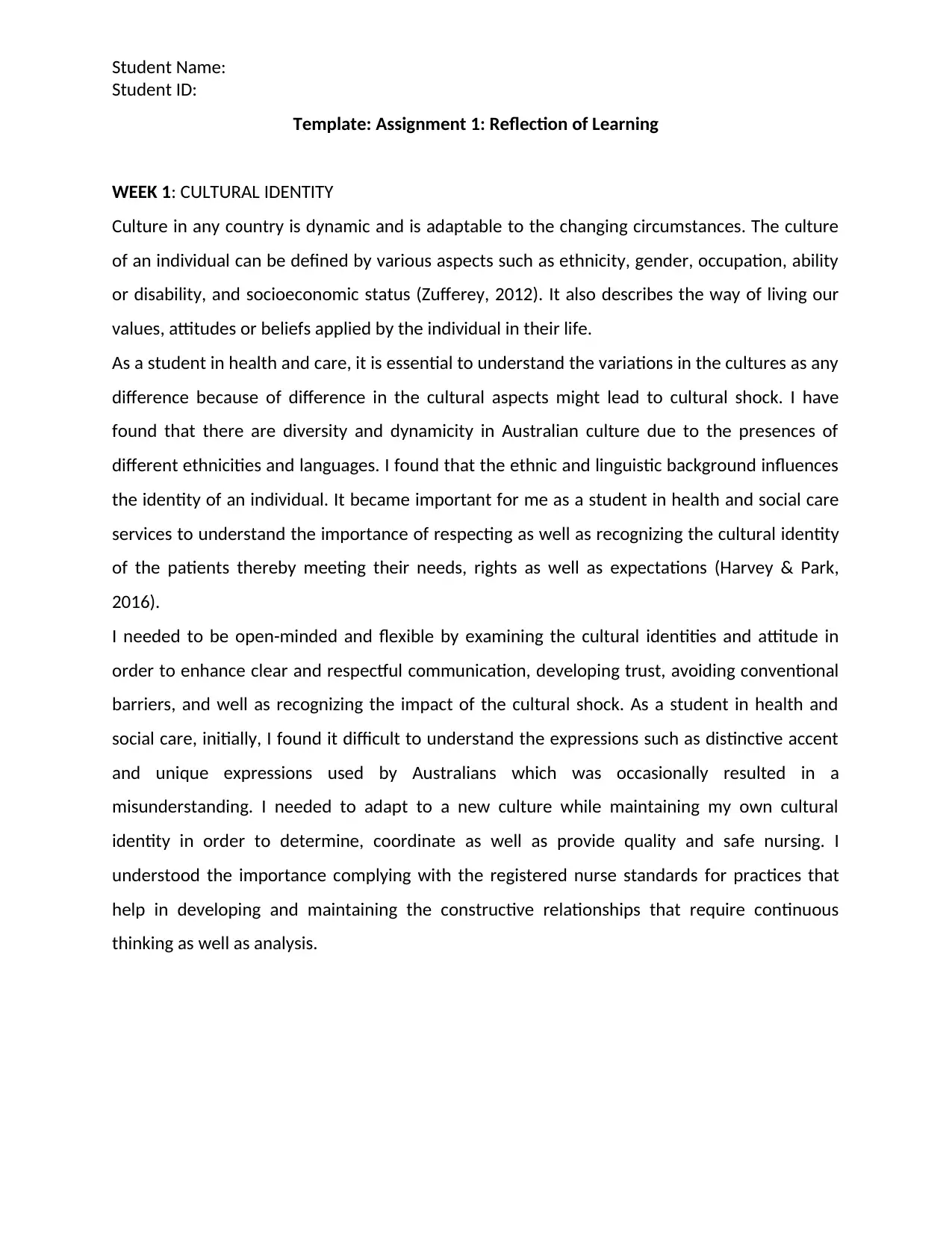
Student Name:
Student ID:
Template: Assignment 1: Reflection of Learning
WEEK 1: CULTURAL IDENTITY
Culture in any country is dynamic and is adaptable to the changing circumstances. The culture
of an individual can be defined by various aspects such as ethnicity, gender, occupation, ability
or disability, and socioeconomic status (Zufferey, 2012). It also describes the way of living our
values, attitudes or beliefs applied by the individual in their life.
As a student in health and care, it is essential to understand the variations in the cultures as any
difference because of difference in the cultural aspects might lead to cultural shock. I have
found that there are diversity and dynamicity in Australian culture due to the presences of
different ethnicities and languages. I found that the ethnic and linguistic background influences
the identity of an individual. It became important for me as a student in health and social care
services to understand the importance of respecting as well as recognizing the cultural identity
of the patients thereby meeting their needs, rights as well as expectations (Harvey & Park,
2016).
I needed to be open-minded and flexible by examining the cultural identities and attitude in
order to enhance clear and respectful communication, developing trust, avoiding conventional
barriers, and well as recognizing the impact of the cultural shock. As a student in health and
social care, initially, I found it difficult to understand the expressions such as distinctive accent
and unique expressions used by Australians which was occasionally resulted in a
misunderstanding. I needed to adapt to a new culture while maintaining my own cultural
identity in order to determine, coordinate as well as provide quality and safe nursing. I
understood the importance complying with the registered nurse standards for practices that
help in developing and maintaining the constructive relationships that require continuous
thinking as well as analysis.
Student ID:
Template: Assignment 1: Reflection of Learning
WEEK 1: CULTURAL IDENTITY
Culture in any country is dynamic and is adaptable to the changing circumstances. The culture
of an individual can be defined by various aspects such as ethnicity, gender, occupation, ability
or disability, and socioeconomic status (Zufferey, 2012). It also describes the way of living our
values, attitudes or beliefs applied by the individual in their life.
As a student in health and care, it is essential to understand the variations in the cultures as any
difference because of difference in the cultural aspects might lead to cultural shock. I have
found that there are diversity and dynamicity in Australian culture due to the presences of
different ethnicities and languages. I found that the ethnic and linguistic background influences
the identity of an individual. It became important for me as a student in health and social care
services to understand the importance of respecting as well as recognizing the cultural identity
of the patients thereby meeting their needs, rights as well as expectations (Harvey & Park,
2016).
I needed to be open-minded and flexible by examining the cultural identities and attitude in
order to enhance clear and respectful communication, developing trust, avoiding conventional
barriers, and well as recognizing the impact of the cultural shock. As a student in health and
social care, initially, I found it difficult to understand the expressions such as distinctive accent
and unique expressions used by Australians which was occasionally resulted in a
misunderstanding. I needed to adapt to a new culture while maintaining my own cultural
identity in order to determine, coordinate as well as provide quality and safe nursing. I
understood the importance complying with the registered nurse standards for practices that
help in developing and maintaining the constructive relationships that require continuous
thinking as well as analysis.
Paraphrase This Document
Need a fresh take? Get an instant paraphrase of this document with our AI Paraphraser
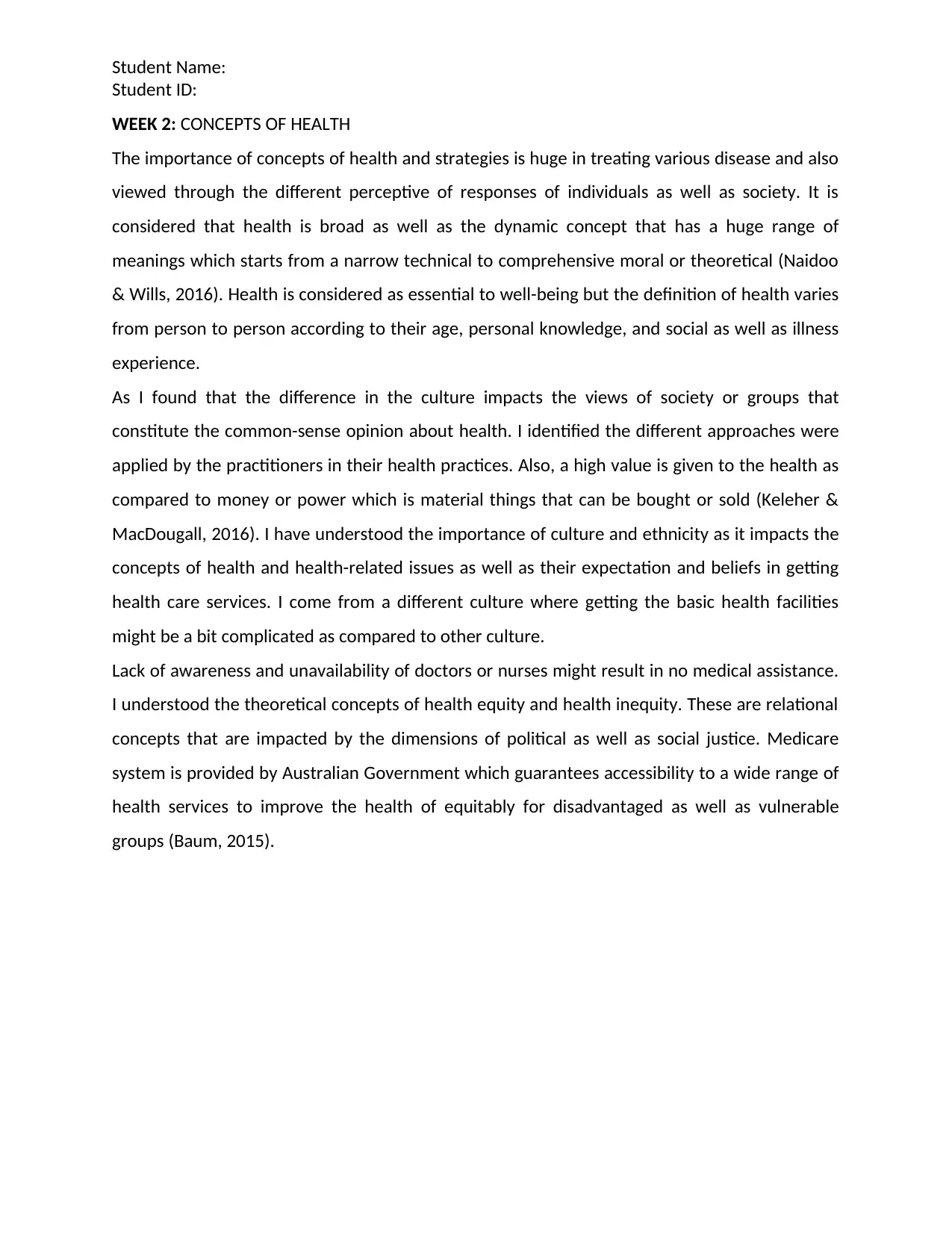
Student Name:
Student ID:
WEEK 2: CONCEPTS OF HEALTH
The importance of concepts of health and strategies is huge in treating various disease and also
viewed through the different perceptive of responses of individuals as well as society. It is
considered that health is broad as well as the dynamic concept that has a huge range of
meanings which starts from a narrow technical to comprehensive moral or theoretical (Naidoo
& Wills, 2016). Health is considered as essential to well-being but the definition of health varies
from person to person according to their age, personal knowledge, and social as well as illness
experience.
As I found that the difference in the culture impacts the views of society or groups that
constitute the common-sense opinion about health. I identified the different approaches were
applied by the practitioners in their health practices. Also, a high value is given to the health as
compared to money or power which is material things that can be bought or sold (Keleher &
MacDougall, 2016). I have understood the importance of culture and ethnicity as it impacts the
concepts of health and health-related issues as well as their expectation and beliefs in getting
health care services. I come from a different culture where getting the basic health facilities
might be a bit complicated as compared to other culture.
Lack of awareness and unavailability of doctors or nurses might result in no medical assistance.
I understood the theoretical concepts of health equity and health inequity. These are relational
concepts that are impacted by the dimensions of political as well as social justice. Medicare
system is provided by Australian Government which guarantees accessibility to a wide range of
health services to improve the health of equitably for disadvantaged as well as vulnerable
groups (Baum, 2015).
Student ID:
WEEK 2: CONCEPTS OF HEALTH
The importance of concepts of health and strategies is huge in treating various disease and also
viewed through the different perceptive of responses of individuals as well as society. It is
considered that health is broad as well as the dynamic concept that has a huge range of
meanings which starts from a narrow technical to comprehensive moral or theoretical (Naidoo
& Wills, 2016). Health is considered as essential to well-being but the definition of health varies
from person to person according to their age, personal knowledge, and social as well as illness
experience.
As I found that the difference in the culture impacts the views of society or groups that
constitute the common-sense opinion about health. I identified the different approaches were
applied by the practitioners in their health practices. Also, a high value is given to the health as
compared to money or power which is material things that can be bought or sold (Keleher &
MacDougall, 2016). I have understood the importance of culture and ethnicity as it impacts the
concepts of health and health-related issues as well as their expectation and beliefs in getting
health care services. I come from a different culture where getting the basic health facilities
might be a bit complicated as compared to other culture.
Lack of awareness and unavailability of doctors or nurses might result in no medical assistance.
I understood the theoretical concepts of health equity and health inequity. These are relational
concepts that are impacted by the dimensions of political as well as social justice. Medicare
system is provided by Australian Government which guarantees accessibility to a wide range of
health services to improve the health of equitably for disadvantaged as well as vulnerable
groups (Baum, 2015).
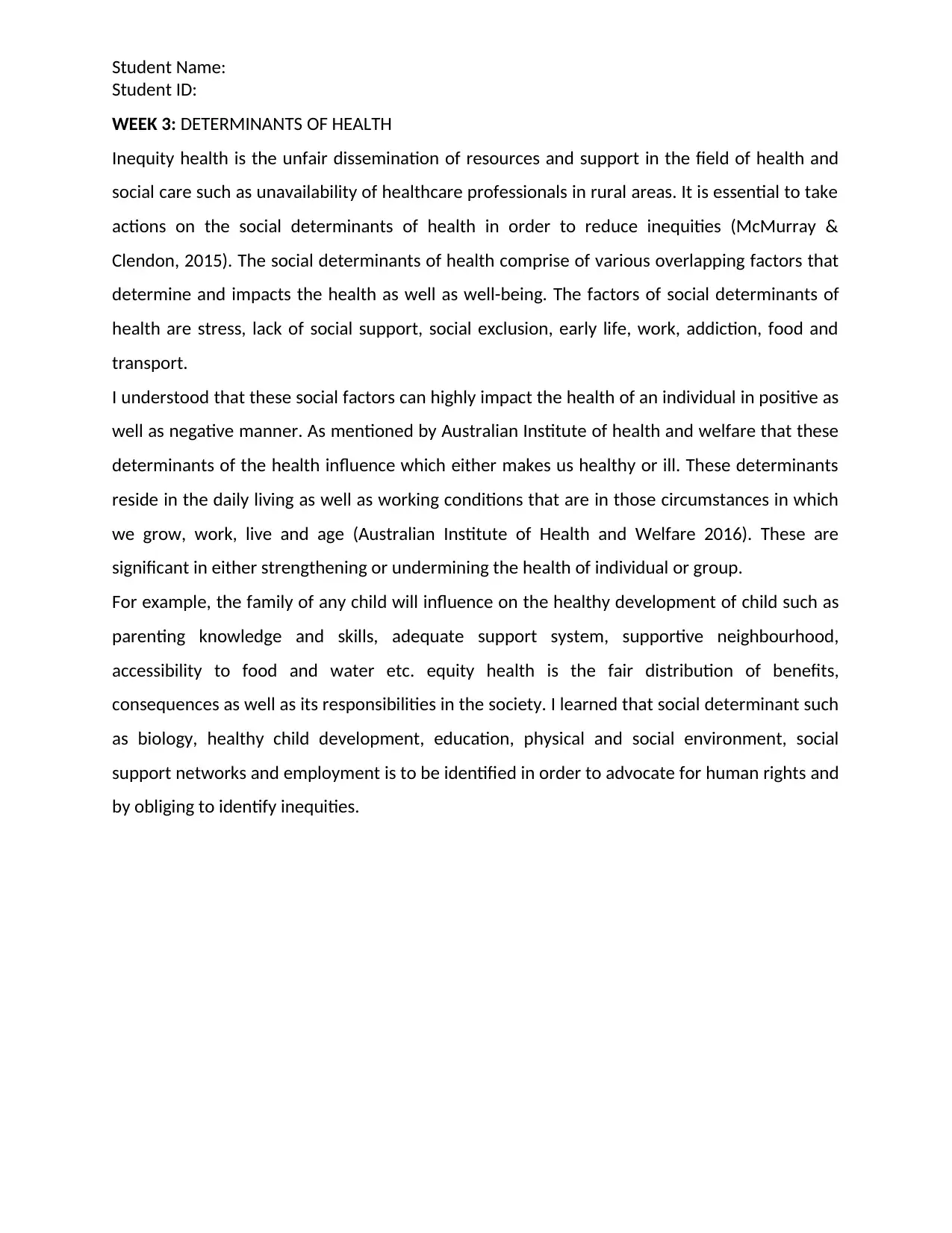
Student Name:
Student ID:
WEEK 3: DETERMINANTS OF HEALTH
Inequity health is the unfair dissemination of resources and support in the field of health and
social care such as unavailability of healthcare professionals in rural areas. It is essential to take
actions on the social determinants of health in order to reduce inequities (McMurray &
Clendon, 2015). The social determinants of health comprise of various overlapping factors that
determine and impacts the health as well as well-being. The factors of social determinants of
health are stress, lack of social support, social exclusion, early life, work, addiction, food and
transport.
I understood that these social factors can highly impact the health of an individual in positive as
well as negative manner. As mentioned by Australian Institute of health and welfare that these
determinants of the health influence which either makes us healthy or ill. These determinants
reside in the daily living as well as working conditions that are in those circumstances in which
we grow, work, live and age (Australian Institute of Health and Welfare 2016). These are
significant in either strengthening or undermining the health of individual or group.
For example, the family of any child will influence on the healthy development of child such as
parenting knowledge and skills, adequate support system, supportive neighbourhood,
accessibility to food and water etc. equity health is the fair distribution of benefits,
consequences as well as its responsibilities in the society. I learned that social determinant such
as biology, healthy child development, education, physical and social environment, social
support networks and employment is to be identified in order to advocate for human rights and
by obliging to identify inequities.
Student ID:
WEEK 3: DETERMINANTS OF HEALTH
Inequity health is the unfair dissemination of resources and support in the field of health and
social care such as unavailability of healthcare professionals in rural areas. It is essential to take
actions on the social determinants of health in order to reduce inequities (McMurray &
Clendon, 2015). The social determinants of health comprise of various overlapping factors that
determine and impacts the health as well as well-being. The factors of social determinants of
health are stress, lack of social support, social exclusion, early life, work, addiction, food and
transport.
I understood that these social factors can highly impact the health of an individual in positive as
well as negative manner. As mentioned by Australian Institute of health and welfare that these
determinants of the health influence which either makes us healthy or ill. These determinants
reside in the daily living as well as working conditions that are in those circumstances in which
we grow, work, live and age (Australian Institute of Health and Welfare 2016). These are
significant in either strengthening or undermining the health of individual or group.
For example, the family of any child will influence on the healthy development of child such as
parenting knowledge and skills, adequate support system, supportive neighbourhood,
accessibility to food and water etc. equity health is the fair distribution of benefits,
consequences as well as its responsibilities in the society. I learned that social determinant such
as biology, healthy child development, education, physical and social environment, social
support networks and employment is to be identified in order to advocate for human rights and
by obliging to identify inequities.
⊘ This is a preview!⊘
Do you want full access?
Subscribe today to unlock all pages.

Trusted by 1+ million students worldwide
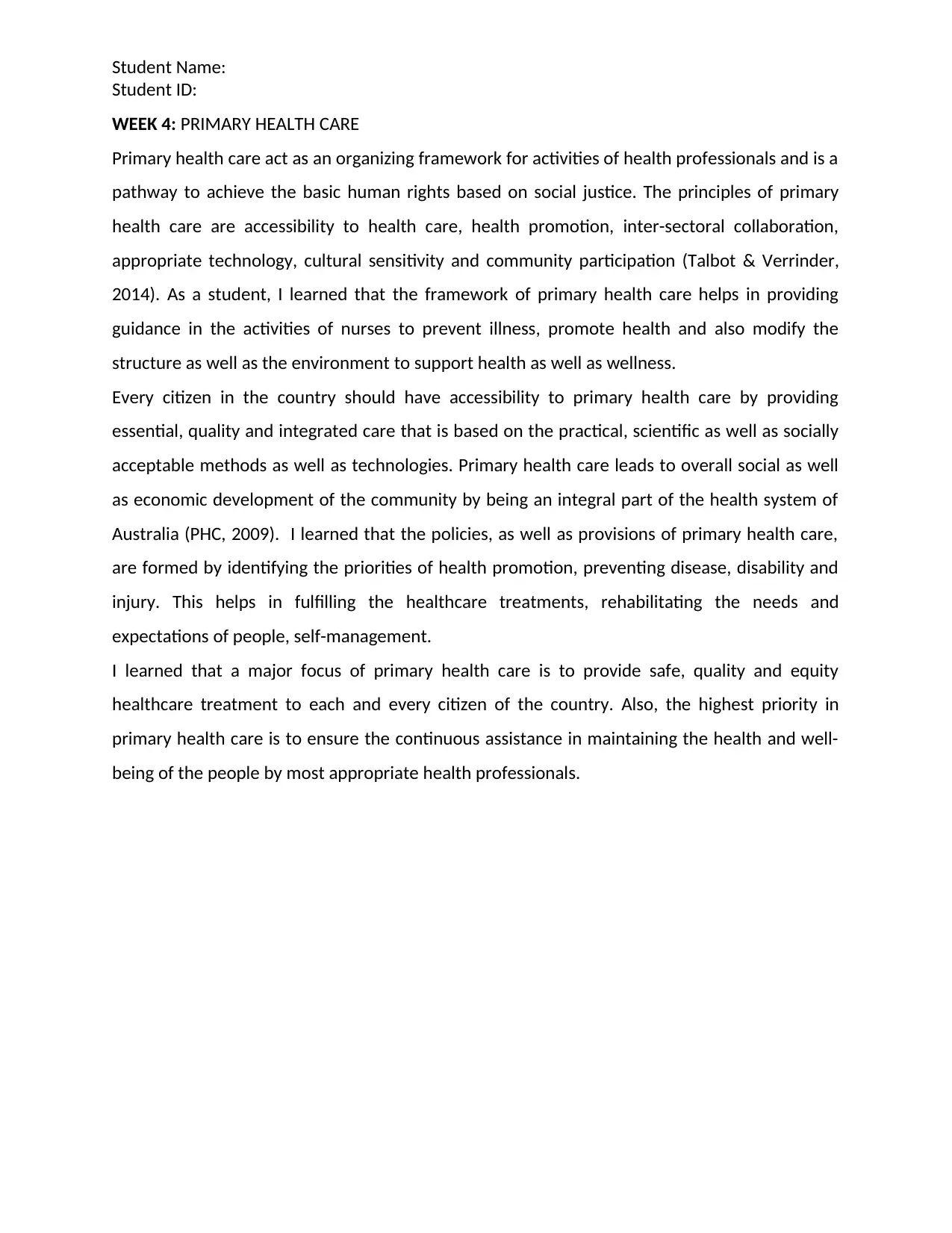
Student Name:
Student ID:
WEEK 4: PRIMARY HEALTH CARE
Primary health care act as an organizing framework for activities of health professionals and is a
pathway to achieve the basic human rights based on social justice. The principles of primary
health care are accessibility to health care, health promotion, inter-sectoral collaboration,
appropriate technology, cultural sensitivity and community participation (Talbot & Verrinder,
2014). As a student, I learned that the framework of primary health care helps in providing
guidance in the activities of nurses to prevent illness, promote health and also modify the
structure as well as the environment to support health as well as wellness.
Every citizen in the country should have accessibility to primary health care by providing
essential, quality and integrated care that is based on the practical, scientific as well as socially
acceptable methods as well as technologies. Primary health care leads to overall social as well
as economic development of the community by being an integral part of the health system of
Australia (PHC, 2009). I learned that the policies, as well as provisions of primary health care,
are formed by identifying the priorities of health promotion, preventing disease, disability and
injury. This helps in fulfilling the healthcare treatments, rehabilitating the needs and
expectations of people, self-management.
I learned that a major focus of primary health care is to provide safe, quality and equity
healthcare treatment to each and every citizen of the country. Also, the highest priority in
primary health care is to ensure the continuous assistance in maintaining the health and well-
being of the people by most appropriate health professionals.
Student ID:
WEEK 4: PRIMARY HEALTH CARE
Primary health care act as an organizing framework for activities of health professionals and is a
pathway to achieve the basic human rights based on social justice. The principles of primary
health care are accessibility to health care, health promotion, inter-sectoral collaboration,
appropriate technology, cultural sensitivity and community participation (Talbot & Verrinder,
2014). As a student, I learned that the framework of primary health care helps in providing
guidance in the activities of nurses to prevent illness, promote health and also modify the
structure as well as the environment to support health as well as wellness.
Every citizen in the country should have accessibility to primary health care by providing
essential, quality and integrated care that is based on the practical, scientific as well as socially
acceptable methods as well as technologies. Primary health care leads to overall social as well
as economic development of the community by being an integral part of the health system of
Australia (PHC, 2009). I learned that the policies, as well as provisions of primary health care,
are formed by identifying the priorities of health promotion, preventing disease, disability and
injury. This helps in fulfilling the healthcare treatments, rehabilitating the needs and
expectations of people, self-management.
I learned that a major focus of primary health care is to provide safe, quality and equity
healthcare treatment to each and every citizen of the country. Also, the highest priority in
primary health care is to ensure the continuous assistance in maintaining the health and well-
being of the people by most appropriate health professionals.
Paraphrase This Document
Need a fresh take? Get an instant paraphrase of this document with our AI Paraphraser
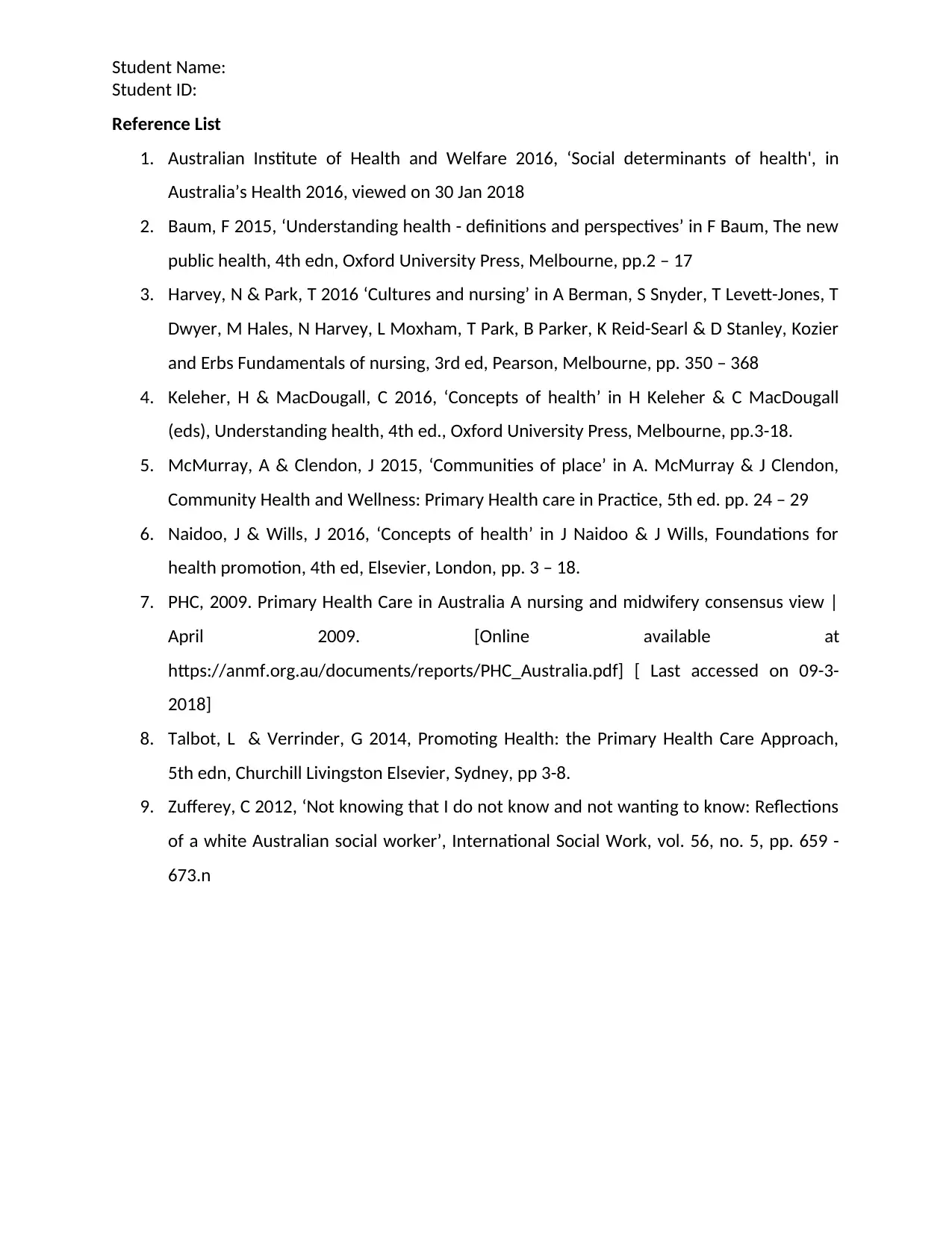
Student Name:
Student ID:
Reference List
1. Australian Institute of Health and Welfare 2016, ‘Social determinants of health', in
Australia’s Health 2016, viewed on 30 Jan 2018
2. Baum, F 2015, ‘Understanding health - definitions and perspectives’ in F Baum, The new
public health, 4th edn, Oxford University Press, Melbourne, pp.2 – 17
3. Harvey, N & Park, T 2016 ‘Cultures and nursing’ in A Berman, S Snyder, T Levett-Jones, T
Dwyer, M Hales, N Harvey, L Moxham, T Park, B Parker, K Reid-Searl & D Stanley, Kozier
and Erbs Fundamentals of nursing, 3rd ed, Pearson, Melbourne, pp. 350 – 368
4. Keleher, H & MacDougall, C 2016, ‘Concepts of health’ in H Keleher & C MacDougall
(eds), Understanding health, 4th ed., Oxford University Press, Melbourne, pp.3-18.
5. McMurray, A & Clendon, J 2015, ‘Communities of place’ in A. McMurray & J Clendon,
Community Health and Wellness: Primary Health care in Practice, 5th ed. pp. 24 – 29
6. Naidoo, J & Wills, J 2016, ‘Concepts of health’ in J Naidoo & J Wills, Foundations for
health promotion, 4th ed, Elsevier, London, pp. 3 – 18.
7. PHC, 2009. Primary Health Care in Australia A nursing and midwifery consensus view |
April 2009. [Online available at
https://anmf.org.au/documents/reports/PHC_Australia.pdf] [ Last accessed on 09-3-
2018]
8. Talbot, L & Verrinder, G 2014, Promoting Health: the Primary Health Care Approach,
5th edn, Churchill Livingston Elsevier, Sydney, pp 3-8.
9. Zufferey, C 2012, ‘Not knowing that I do not know and not wanting to know: Reflections
of a white Australian social worker’, International Social Work, vol. 56, no. 5, pp. 659 -
673.n
Student ID:
Reference List
1. Australian Institute of Health and Welfare 2016, ‘Social determinants of health', in
Australia’s Health 2016, viewed on 30 Jan 2018
2. Baum, F 2015, ‘Understanding health - definitions and perspectives’ in F Baum, The new
public health, 4th edn, Oxford University Press, Melbourne, pp.2 – 17
3. Harvey, N & Park, T 2016 ‘Cultures and nursing’ in A Berman, S Snyder, T Levett-Jones, T
Dwyer, M Hales, N Harvey, L Moxham, T Park, B Parker, K Reid-Searl & D Stanley, Kozier
and Erbs Fundamentals of nursing, 3rd ed, Pearson, Melbourne, pp. 350 – 368
4. Keleher, H & MacDougall, C 2016, ‘Concepts of health’ in H Keleher & C MacDougall
(eds), Understanding health, 4th ed., Oxford University Press, Melbourne, pp.3-18.
5. McMurray, A & Clendon, J 2015, ‘Communities of place’ in A. McMurray & J Clendon,
Community Health and Wellness: Primary Health care in Practice, 5th ed. pp. 24 – 29
6. Naidoo, J & Wills, J 2016, ‘Concepts of health’ in J Naidoo & J Wills, Foundations for
health promotion, 4th ed, Elsevier, London, pp. 3 – 18.
7. PHC, 2009. Primary Health Care in Australia A nursing and midwifery consensus view |
April 2009. [Online available at
https://anmf.org.au/documents/reports/PHC_Australia.pdf] [ Last accessed on 09-3-
2018]
8. Talbot, L & Verrinder, G 2014, Promoting Health: the Primary Health Care Approach,
5th edn, Churchill Livingston Elsevier, Sydney, pp 3-8.
9. Zufferey, C 2012, ‘Not knowing that I do not know and not wanting to know: Reflections
of a white Australian social worker’, International Social Work, vol. 56, no. 5, pp. 659 -
673.n
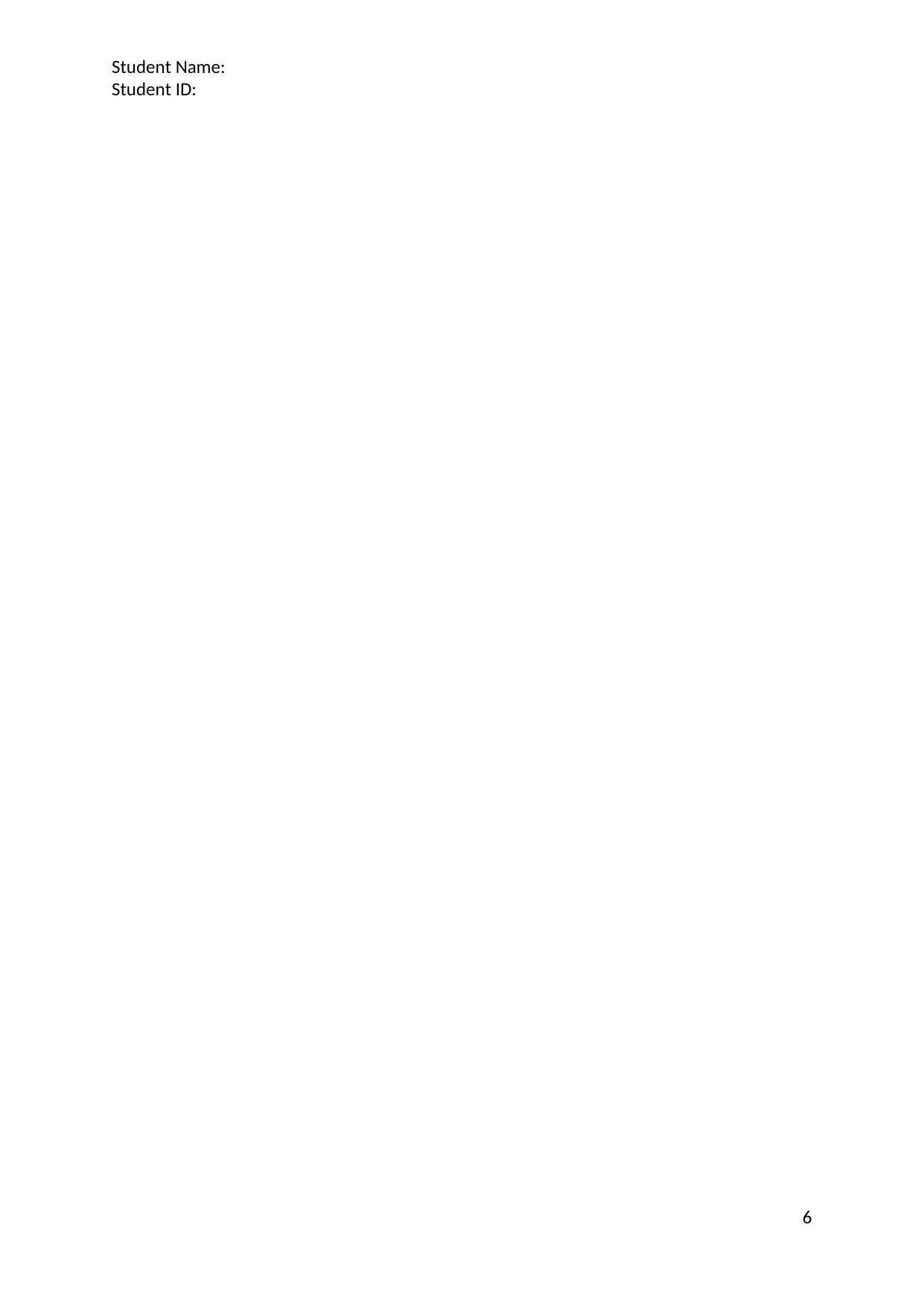
Student Name:
Student ID:
6
Student ID:
6
⊘ This is a preview!⊘
Do you want full access?
Subscribe today to unlock all pages.

Trusted by 1+ million students worldwide
1 out of 6
Related Documents
Your All-in-One AI-Powered Toolkit for Academic Success.
+13062052269
info@desklib.com
Available 24*7 on WhatsApp / Email
![[object Object]](/_next/static/media/star-bottom.7253800d.svg)
Unlock your academic potential
Copyright © 2020–2026 A2Z Services. All Rights Reserved. Developed and managed by ZUCOL.





